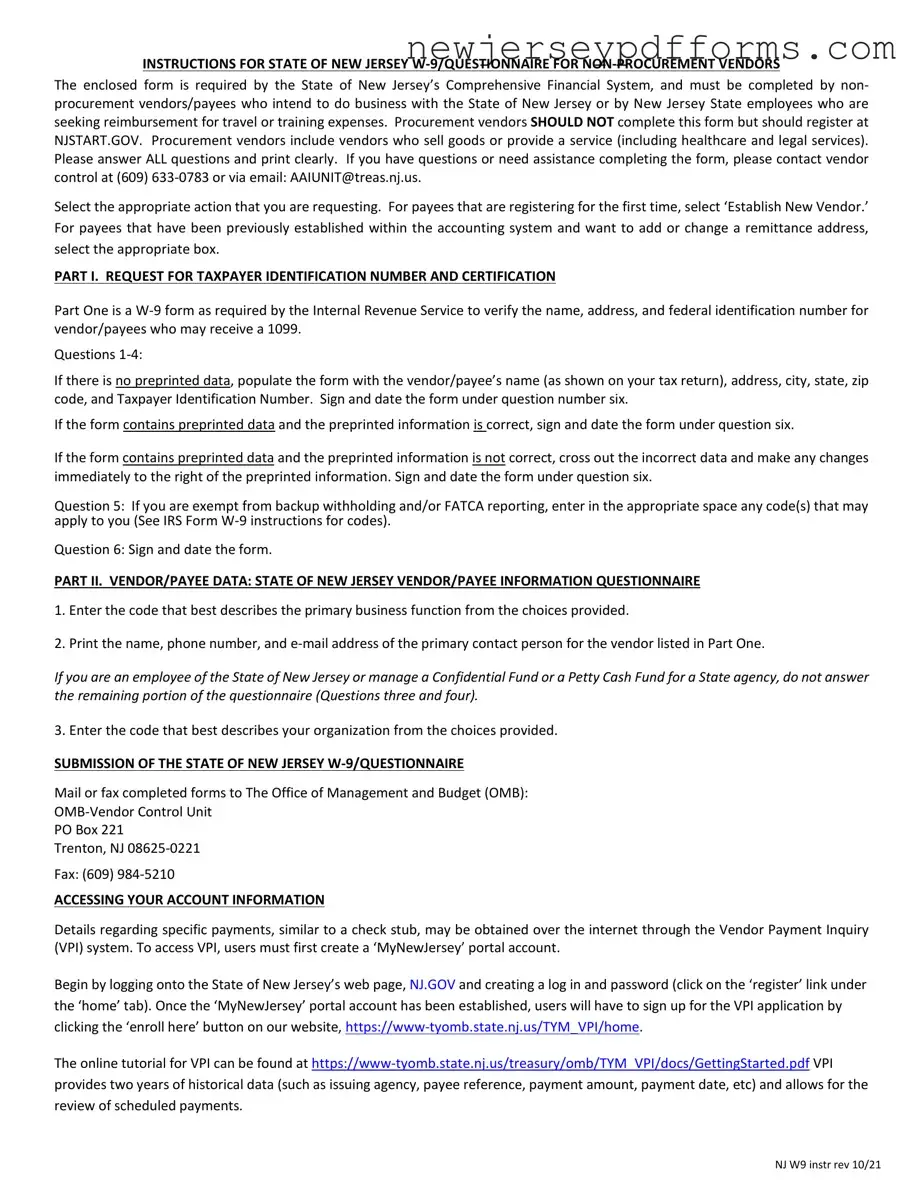What is the purpose of the New Jersey W-9 form?
The New Jersey W-9 form is required for non-procurement vendors and payees who wish to do business with the State of New Jersey. It is also necessary for state employees seeking reimbursement for travel or training expenses. This form helps verify the vendor's name, address, and taxpayer identification number, ensuring that the state can accurately maintain its financial records.
Who should complete the New Jersey W-9 form?
Only non-procurement vendors and payees should complete the New Jersey W-9 form. This includes individuals or entities that provide services or receive payments but do not sell goods. Procurement vendors, who are involved in selling goods or providing services like healthcare and legal services, must register at NJSTART.GOV instead of completing this form.
What information is required on the New Jersey W-9 form?
The form requires the vendor's name, address, and taxpayer identification number. If there is preprinted information on the form, it should be verified for accuracy. Additional information includes the primary business function code and contact details for the vendor. This information is crucial for establishing the vendor's profile in the state's financial system.
How should I submit the completed New Jersey W-9 form?
Completed forms can be submitted by mailing or faxing them to the Office of Management and Budget (OMB) at the designated address: OMB-Vendor Control Unit, PO Box 221, Trenton, NJ 08625-0221. The fax number for submission is (609) 984-5210. It is important to ensure that the form is completed accurately before submission to avoid delays in payment.
What should I do if I notice incorrect preprinted information on the form?
If the form contains incorrect preprinted information, it should be crossed out, and the correct data should be written immediately next to it. After making the necessary corrections, the vendor must sign and date the form to certify the accuracy of the information provided.
What is the significance of signing the form?
Signing the New Jersey W-9 form is a certification of the accuracy of the taxpayer identification number provided and a declaration that the individual is not subject to backup withholding. This signature is essential for the processing of payments, as it assures the state that the information is correct and complete.
Can I access my payment information after submitting the W-9 form?
Yes, once you have submitted the W-9 form and established your vendor profile, you can access your payment information through the Vendor Payment Inquiry (VPI) system. To use this system, you must first create a 'MyNewJersey' portal account. This will allow you to view details regarding specific payments, including historical data for up to two years.
What should I do if I have questions while completing the form?
If you have questions or need assistance while completing the New Jersey W-9 form, you can contact the vendor control office at (609) 633-0783 or send an email to AAIUNIT@treas.nj.us. They can provide guidance and support to ensure that your form is filled out correctly.
What happens if I do not submit the New Jersey W-9 form?
Failure to submit the New Jersey W-9 form may result in delays in receiving payments from the State of New Jersey. The state requires this information to establish and maintain its vendor records. Therefore, it is crucial to complete, sign, and return the form promptly to avoid any interruptions in payment processing.

